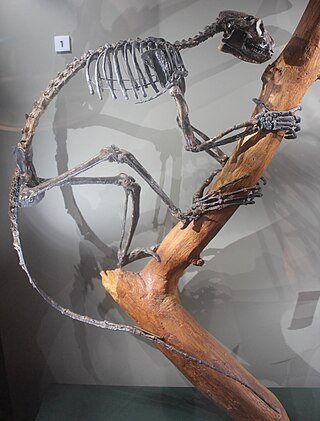Pronycticebus was a genus of adapiformes primates that lived during the middle to middle late Eocene. It is represented by two species, Pronycticebus gaudryi and Pronycticebus neglectus, of which an almost complete specimen was found in Germany, and the Quercy Phosphorites Formation of France.

Smilodectes is a genus of adapiform primate that lived in North America during the middle Eocene. It possesses a post-orbital bar and grasping thumbs and toes. Smilodectes has a small cranium size and the foramen magnum was located at the back of the skull, on the occipital bone.
Hesperolemur is a genus of adapiform primate that lived in the middle Eocene of southern California. It is an immigrant taxa which appears to be most closely related to the earlier European forms of Cantius. It was approximately 4.5 kilograms (9.9 lb) in weight and was the last surviving notharctine species, probably because of its position in the refugia that existed in southern California during the climate deterioration at the end of the middle Eocene. There are no later taxa that appear to have derived from Hesperolemur.

Pelycodus is an extinct genus of adapiform primate that lived during the early Eocene (Wasatchian) period in Europe and North America, particularly Wyoming and New Mexico. It is very closely related to Cantius and may even be its subgenus. It may also have given rise to the Middle Eocene Uintan primate Hesperolemur, although this is controversial. From mass estimates based on the first molar, the two species, P. jarrovii and P. danielsae, weighed 4.5 kg and 6.3 kg respectively and were frugivores with an arboreal, quadrupedal locomotion.

Cercamoniinae is a subfamily within the extinct primate family Notharctidae primarily found in Europe, although a few genera have been found in North America and Africa.

Europolemur is a genus of adapiform primates that lived in Europe during the middle Eocene.
Anchomomys is a genus of adapiform primate that lived in Europe and Africa during the middle Eocene.
Panobius is a genus of adapiform primate that lived in Asia during the early or middle Eocene.

Protoadapis is a genus of adapiform primate that lived in Europe during the early middle Eocene.

Caenopithecus is a genus of adapiform primate that lived in Europe during the middle Eocene.
Copelemur is a genus of adapiform primate that lived in North America during the early Eocene.
Sivaladapinae is a subfamily of adapiform primate that lived in Asia during the middle to late Miocene.
Hoanghoniinae is a subfamily of adapiform primate that lived in Asia during the middle to late Eocene.
Lushius is a genus of adapiform primate that lived in China during the late Eocene, and is classified under the subfamily Hoanghoniinae.

Hoanghonius is a genus of adapiform primate that lived in Asia during the middle Eocene.
Rencunius is a genus of adapiform primate that lived in Asia during the late middle Eocene. It includes the species Rencunius zhoui.
Wailekia is a genus of adapiform primate that lived in Asia during the late Eocene.
Shizarodon is a genus of primate related to lemuriforms that lived in Oman during the early Oligocene.
Cryptadapis is a genus of adapiform primate that lived in Europe during the late Eocene.
Microadapis is a genus of adapiform primate that lived in Europe during the middle Eocene.







